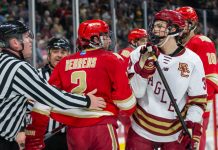Though most feel that fan interest is still strong in Canada, there have been indications that support for the NHL in the United States during the lockout is not as solid.
One poll, conducted in the U.S. by Zogby International shortly after the start of the lockout, indicated that 60 percent of those polled between the ages of 18-29 did not know that the NHL season had failed to start on time. Additionally, 69 percent overall said that they had little interest in watching when the NHL started up again.
Denver defenseman Brett Skinner said, “As those numbers indicate, the game is really taking a hit. I hope that when the new CBA [collective bargaining agreement] is figured out it will only help the game to get better, and in the long run improve the sport and fan popularity.”
Others agreed with this thinking. Michigan forward Jeff Tambellini said, “It is so important for the league to get back to playing now — taking a step backwards could be a disaster.”
A pair of Colorado College defensemen stated their concern over the lockout’s possible effects as well.
Brady Greco said, “Just when things were going in the right direction for the league, this had to take place.”
Teammate Mark Stuart added, “Hockey has struggled to capture the interest that other professional sports do and the lockout seems to be setting us back even more. I’m hoping that it gets resolved and that the fans of hockey don’t lose interest.”
Forward Colin Murphy of Michigan Tech holds hope for the fan situation. “Fan interest is low right now due to the lockout — there is not much to cheer about. However, when they come to an agreement, I truly believe the fans will jump aboard again and continue to cheer for their teams both in Canada and the United States.”
Surprisingly, in talking to the college players, there seems to be as much interest in getting the NHL game up and running as fans than as potential professional players. Several players indicated that they had been missing the game from a fan’s standpoint.
“Being a hockey fan,” said Murphy, “and a huge fan of NHL hockey, it would be great to see the NHLPA and owners come to terms.”
Said Skinner, “As a fan of the game, I understand why this lockout is frustrating to the public. Playing here in Denver, I’ve gotten out to a few Avalanche games a year.
“I hope both sides can negotiate a new deal as soon as possible, because as a fan, I miss watching the games.”
One question that college hockey fans wondered about at the beginning of the lockout was whether the lack of NHL play would create more excitement for college hockey.
After noting the negative impacts the lockout has had on the pro game, Denver’s Skinner said, “On the flipside, it has been great for college hockey so far. I know that here in Denver, we have attracted some of the Avalanche fans to our games, and I think the overall popularity of college hockey has grown in the absence of the NHL.”
Tambellini agreed, saying, “There has been an increase in TV time, [but] we really thought there would be more of a change, but for the most part, NHL fans are NHL fans and college fans are college fans.”
College players trying to make the NHL may also have a different pathway in front of them. There is concern that because many NHL players are finding other teams to play on, there are fewer roster spots open, and thus, fewer opportunities for outgoing college players.
“At the end of the year, I could leave and go play pro somewhere,” said senior Colin Murphy, “but with the lockout, there aren’t a lot of spots available out there for college players.” He added that if the lockout were to continue, “I think it would negatively affect my development towards the NHL.”
Tambellini added, “You have to have a place to play. There are a lot of guys out there just pushing for a roster spot.”
Stuart noted the uniqueness of the situation, in which players are still working towards playing in a league that doesn’t currently operate. “The NHL is a goal for me and it’s strange when that goal isn’t going on right now.”
Through it all, the main issue at stake for players is the future of the NHL.
Said Skinner, “There is a business side of the game that I think has to get sorted out, and I think both sides are really concerned with getting it right so that in future years the game continues to grow in popularity.”
Echoing his statements was Tambellini: “These are complex issues. It is important to get it fixed, not just for now, but for 30 years down the road as well. Hopefully, it’ll happen.”
Greco added, “I personally believe that each side needs to compromise so that hockey and the NHL are not given another black eye.”
One constant is the dedication these players have towards reaching the NHL. As Tambellini said, “The NHL is the best league in the world — everyone who plays this game strives to make the NHL.”


